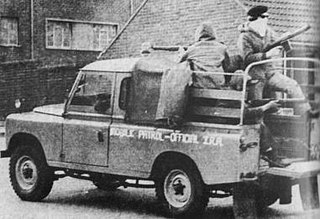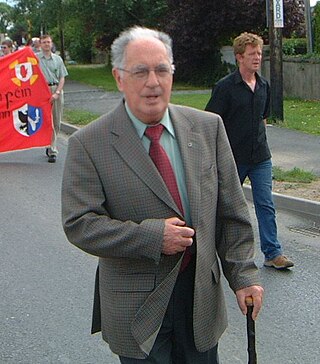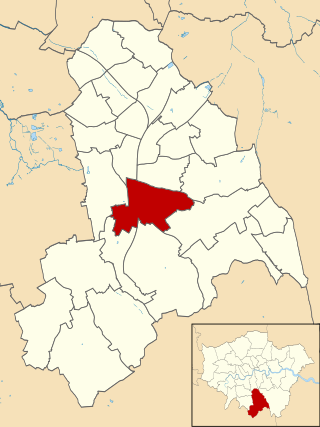Related Research Articles

The Provisional Irish Republican Army, officially known as the Irish Republican Army and informally known as the Provos, was an Irish republican paramilitary force that sought to end British rule in Northern Ireland, facilitate Irish reunification and bring about an independent republic encompassing all of Ireland. It was the most active republican paramilitary group during the Troubles. It argued that the all-island Irish Republic continued to exist, and it saw itself as that state's army, the sole legitimate successor to the original IRA from the Irish War of Independence. It was designated a terrorist organisation in the United Kingdom and an unlawful organisation in the Republic of Ireland, both of whose authority it rejected.
Sinn Féin is an Irish republican and democratic socialist political party active in both the Republic of Ireland and Northern Ireland.

The Official Irish Republican Army or Official IRA was an Irish republican paramilitary group whose goal was to remove Northern Ireland from the United Kingdom and create a "workers' republic" encompassing all of Ireland. It emerged in December 1969, shortly after the beginning of the Troubles, when the Irish Republican Army (IRA) split into two factions. The other was the Provisional IRA. Each continued to call itself simply "the IRA" and rejected the other's legitimacy.

Bloody Friday is the name given to the bombings by the Provisional Irish Republican Army (IRA) in Belfast, Northern Ireland on 21 July 1972, during the Troubles. At least twenty bombs exploded in the space of eighty minutes, most within a half-hour period. Most of them were car bombs and most targeted infrastructure, especially the transport network. Nine people were killed: five civilians, two British soldiers, a Royal Ulster Constabulary (RUC) reservist, and an Ulster Defence Association (UDA) member, while 130 were injured. The IRA said it sent telephoned warnings at least thirty minutes before each explosion and said that the security forces wilfully ignored some of the warnings for their own ends. The security forces said that was not the case and said they were overstretched by the sheer number of bombs and bomb warnings, some of which were hoaxes.

Republican Sinn Féin or RSF is an Irish republican political party in Ireland. RSF claims to be heirs of the Sinn Féin party founded in 1905; the party took its present form in 1986 following a split in Sinn Féin. RSF members take seats when elected to local government in the Republic of Ireland, but do not recognise the validity of the Partition of Ireland. It subsequently does not recognise the legitimacy of the parliaments of Northern Ireland (Stormont) or the Republic of Ireland, so the party does not register itself with them.

Ruairí Ó Brádaigh was an Irish republican political and military leader. He was Chief of Staff of the Irish Republican Army (IRA) from 1958 to 1959 and again from 1960 to 1962, president of Sinn Féin from 1970 to 1983, and president of Republican Sinn Féin from 1987 to 2009.
Events in the year 1972 in Ireland.

Dáithí Ó Conaill was an Irish republican, a member of the IRA Army Council of the Provisional IRA, and vice-president of Sinn Féin and Republican Sinn Féin. He was also the first chief of staff of the Continuity IRA, from its founding in 1986 until his death in 1991. He is credited with introducing the car bomb to Northern Ireland.
Sinn Féin is the name of an Irish political party founded in 1905 by Arthur Griffith. It became a focus for various forms of Irish nationalism, especially Irish republicanism. After the Easter Rising in 1916, it grew in membership, with a reorganisation at its Ard Fheis in 1917. It split in 1922 in response to the Anglo-Irish Treaty which led to the Irish Civil War and saw the origins of Fianna Fáil and Fine Gael, the two parties which have since dominated Irish politics. Another split in the remaining Sinn Féin organisation in the early years of the Troubles in 1970 led to the Sinn Féin of today, which is a republican, left-wing nationalist and secular party.
Myles P. Shevlin was an Irish republican Dublin-based solicitor known as the Provisional Irish Republican Army (IRA) "legal adviser"' Shevlin represented several individuals accused of IRA membership and/or activity. During the IRA border campaign of the late 1950s, Shevlin was for a time the IRA Adjutant-General and a member of its Army Council. With the outbreak of The Troubles in the late 1960's Shevlin smuggled weapons to the IRA in the north.

Brendan Hughes, also known as "The Dark", and "Darkie" was a leading Irish republican and former Officer Commanding (OC) of the Belfast Brigade of the Provisional Irish Republican Army (IRA). He was the leader of the 1980 Irish hunger strike.

The Belfast Brigade of the Provisional IRA was the largest of the organisation's brigades, based in the city of Belfast, Northern Ireland.

Miriam Daly was an Irish republican and communist activist as well as a university lecturer who was assassinated by the loyalist Ulster Defence Association (UDA) in 1980.

South Croydon is a ward in the London Borough of Croydon, London in the United Kingdom, covering part of the Croham Hurst and South Croydon.

Seán Mac Stíofáin was an English-born chief of staff of the Provisional IRA, a position he held between 1969 and 1972.

The Abercorn Restaurant bombing was a bomb attack that took place in a crowded city centre restaurant and bar in Belfast, Northern Ireland on 4 March 1972. The bomb explosion claimed the lives of two young women and injured over 130 people. Many of the injuries were severe and included the loss of limbs and eyes. The Provisional IRA was blamed, although no organisation ever claimed responsibility and nobody was ever charged in connection with the bombing. According to Ed Moloney, an Irish journalist who has written extensively about the IRA, republican sources have unofficially confirmed the group's involvement.

The Donegall Street bombing took place in Belfast, Northern Ireland on 20 March 1972 when, just before noon, the Provisional IRA detonated a car bomb in Lower Donegall Street in the city centre when the street was crowded with shoppers, office workers, and many schoolchildren.

The 1973 Old Bailey bombing was a car bomb attack carried out by the Provisional IRA (IRA) which took place outside the Old Bailey Courthouse on 8 March 1973. The attack was carried out by an 11-person active service unit (ASU) from the Provisional IRA Belfast Brigade. The unit also exploded a second bomb which went off outside the Ministry of Agriculture near Whitehall in London at around the same time the bomb at the Old Bailey went off.
Leo Martin (1937–2011) was a founder of the Provisional IRA in Belfast and a prominent figure in The Troubles.
References
- 1 2 3 4 5 6 7 McKittrick, David (6 December 2008). "Maria Gatland: From terrorist to Tory". Belfast Telegraph . Retrieved 27 May 2017.
- ↑ Coogan, Tim Pat (2002). The IRA. New York: St. Martins Press. p. 433. ISBN 0-312-29416-6.
- 1 2 McGuire, Maria (1973) To Take Arms: A Year in the Provisional IRA, Macmillan. ISBN 978-0333145067
- ↑ Melaugh, Dr Martin. "CAIN: Events: Bloody Friday – Northern Ireland Office News-sheet on 'Bloody Friday'". cain.ulst.ac.uk.
- ↑ Smith, Colin (7 December 2008). "How I brought the Provos' girl with a gun in from the cold". The Observer . p. 36. Retrieved 10 November 2019.
- 1 2 Myers, Kevin (5 December 2008). Was it fair Gatland had to resign because of her past IRA links?, Belfast Telegraph . Retrieved 6 July 2021.
- ↑ Truman, Peter (14 January 2009). "IRA Councillor welcomed back to Tory bosom". Croydon Guardian . Retrieved 4 March 2019.